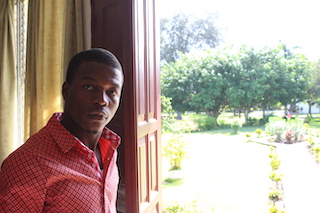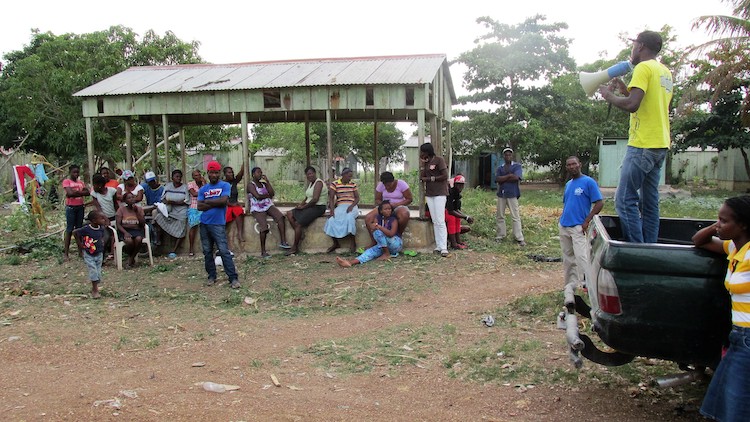Add and Subtract

Kendry Paulina (1998) Batey Bombita, Barahona. He is in the process of completing secondary studies. He is not married nor does he have children. He has his national identity and electoral card.
My father is a farmer and my mother is a homemaker, they both work day by day to be able to satisfy us in every way they can, but their financial situation does not allow them to do much since my dad dedicates himself to sowing beans. Every morning my father has to get up at 5:00 am to feed his horse and then file his machete to go to work.
From my childhood I remembered that at 7:00 am he went into work and at around 9:30 and 10:00 am—my mother would bring him breakfast so that he could hold off until 2:00 pm, this without a day of rest, because the only day he could take to rest, he took to work for a lottery kiosk.1
On Sundays he got up at 6:00 am to be able to sell the numbers in the rural area where he lived. The small rural town (campito) only consists of some 30 houses, separated by a distance of 3 to 10 km. In this rural town there are no grocery stores where you can buy food, detergents or other items of basic everyday use. Every Sunday and Wednesday my dad has to go down to the nearest town to play his lottery numbers and take the opportunity to buy food, detergents and other household items. The town is about 20 to 25 km away, and every Sunday and Wednesday he has to travel by horseback and take these bad roads, full of trees blocking the path. Life in the countryside is a very lonely life, since not so many people live there anymore and, sometimes, my dad has been obligated to stay by himself in the countryside, since the few people that are there have moved to town.
In that rural town I lived and grew up for almost seven years, without access to education or anything; but, in all that time, I lived happily because I had adapted to the way of life in the country, since I didn’t know what I was losing without having been in school studying. In 2005 my mother decided to come to live in a batey called Bombita so that we could go to school. This batey at that time was very dusty and, when it rained, there were puddles of water in its streets for up to a month. There, life was worse than in the other rural town where I lived previously, because whoever had a house, paid for their rent, while in the country, this was not the case.
He who did not have a stable profession, lived “echando días”2 washing off and cleaning plantains, doing any other farming duties or chopping cane, that is if he had the ID from the sugar cane company. In my family’s case, life was more miserable there for us, because we were new and my dad could not “echar los días” from work that easily. This batey had a basic level educational center, there was running electricity, a couple of groceries stores (there were none where I lived before), it had (or has) a polyclinic,3 etc. The difference between the rural town and the batey was that the rural town did not have any of those benefits previously mentioned.
During the first two years, my family and I lived in a rental, but thank God my dad worked and was able to buy a house. It’s a step up because we didn’t have our own house; In the country we lived in a house on a farm.We did not have to pay for it, but it was not ours…
Time passed and my parents separated due to conflicts. My dad had to return to the countryside again and my mother stayed in the batey with us so we could continue to study. After my parents’ separation some months passed, and my mother had to marry another man. With the separation of my parents I knew what it was to go hungry, to have needs: sometimes we ate only once a day because my stepfather found it hard to get a day’s work: he would find work one day and then lasted two to three days without getting anything else, and it only paid 150 to 200 pesos per day. That was very hard, sometimes I would come home from school and would go to sleep with only the milk and bread they gave at school, without eating anything at home.
I suffered a lot when I saw my parents get into arguments and fights during the process of their separation, because I have never liked to see my parents argue. When my parents separated I went almost four years without seeing my dad because I was so young, and my mother didn’t take us to visit him… nor did he come to visit us.
When I was 10 to 11 years old my mother sent us to spend vacations with my dad, while she stayed in the batey to spend the holidays during the month of December. We also spent the school vacation from June to August. During these vacations we always got a little bored because they were very long, since we had no source of fun: there were no rivers or children like us so we could play.
At first we loved it, but after 20 or 30 days we got tired of the same routine. On many occasions my dad did not have anything to feed us, because the beans were planted in March and then the rainfall in May damaged them. They barely provided enough to eat because it rained daily for up to 10 and 15 days; the land was very cold and there was no work on the farm so that those who lived there could work. In those months between June and the beginning of August, he who did not have a small farming land did not eat because there was no other type of work.
On the other hand, the holidays in December we loved because they were short, there were always many oranges, grapefruit, ripe bananas and sweet lemons and dad always had money. There was always food in the house because [my father] collected coffee and sold guandules4 he collected on his small farming land, and those were the best vacations!
But after growing up we saw things differently. One afternoon, my sister and I sat down with my dad and told him what our lives were like in the batey. He felt so sorry, because our situation was terrible: we were always hungry, we lacked many things that any young adolescent should have.
Years passed and my mother separated from the man she had married. That was when my sister and I proposed that her and my dad come together again so that together they could all move forward as a family. Even though my stepfather didn’t treat us badly, I wanted my mother to be reunited with my father again because that’s how I felt at ease… as a family. It so happened that my parents took our advice and reunited again. Now they live in the countryside and we live in the batey, where they work and we study in the batey.
Seeing my parents’ financial situation is what motivates me every day to continue studying. And not only their situation, but my neighbors and other people I know in the batey who do not have a profession: they find it difficult to find work to get 200 pesos… That motivates me to keep moving forward. I have that desire to overcome, to be a math teacher in about five years and thus get my parents out of poverty. I know, with God’s help, I will achieve it. Now I’m finishing high school and I’m going to college in January. With the help of God I will be a math teacher… my parents are my main source of motivation for the bettering of my future.

-
Jairo Severino of elDinero states in his article, “In the DR there are 154 bancos [lottery kiosks] for each school,” that “these businesses, most of them illegal, operate without one dose of regulation; out in the open and placed anywhere, exceeding the capacity of the authorities to inspect them. Since the enactment of Law 139-11, which regulates banks, casinos and gambling, the irregular number of these establishments has tripled, based on the fact that 30,750 operate with permits. However, conservative estimates of the ‘banqueadores’ place the amount at just over 100,000, and could reach 120,000 throughout the national territory.” ↩︎
-
“Echar días” makes reference to an informal job without any commitment or protection by or from the employer or the state. In rural areas, day laborers tend to work the land; in the city it is common to work in construction. ↩︎
-
Local first response health centers addressing multiple needs. ↩︎
-
Pigeon peas ↩︎